In the education systems of England, Northern Ireland, Wales, Jamaica, Trinidad and Tobago and some other Commonwealth countries, sixth form represents the final two years of secondary education, ages 16 to 18. Pupils typically prepare for A-level or equivalent examinations like the International Baccalaureate or Cambridge Pre-U. In England, Wales, and Northern Ireland, the term Key Stage 5 has the same meaning. It only refers to academic education and not to vocational education.

Matriculation is the formal process of entering a university, or of becoming eligible to enter by fulfilling certain academic requirements such as a matriculation examination.
An examination board is an organization that sets examinations, is responsible for marking them, and distributes the results. Some are run by governmental entities; some are run as not-for-profit organizations.
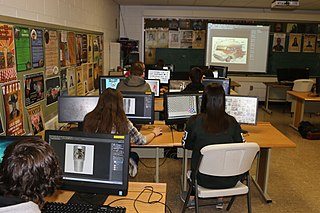
Twelfth grade is the twelfth year of formal or compulsory education. It is typically the final year of secondary school and K–12 in most parts of the world. Students in twelfth grade are usually 17–18 years old. Some countries have a thirteenth grade, while other countries do not have a 12th grade/year at all.
The Indian Certificate of Secondary Education (ICSE) is an examination conducted by the Council for the Indian School Certificate Examinations, a private board designed to provide an examination in a course of general education, in accordance with the recommendations of the New Education Policy 2020 (India), through the medium of English. The examination allows secure suitable representations of responsible schools in their states or territories. The National Admissions and Accreditation agency of the UK, UCAS recognizes ICSE at par with the Higher School qualification of University of Scotland.
In education, an entrance examination or admission examination is an examination that educational institutions conduct to select prospective students. It may be held at any stage of education, from primary to tertiary, even though it is typically held at tertiary stage.

Father Conceicao Rodrigues Institute of Technology (FCRIT) is a private engineering college affiliated to the University of Mumbai located in Vashi, Navi Mumbai. The institute offers the B.E degree courses in Computer Engineering, Electrical Engineering, Mechanical Engineering, Electronics and Telecommunication Engineering and Information Technology.
In India, board examinations refer to the public examinations that are conducted at the completion of secondary and senior secondary education.
Madhyamik Pariksha or simply Madhyamik is a centralized examination conducted by the West Bengal Board of Secondary Education in West Bengal, India, at the end of the 10th year of school education. Similarly, one examination is also conducted at the state of Tripura for its students studying in Govt or Govt Aided school under the control of Tripura Board of Secondary Education. By count of examinees, it is among the better-known 10th standard examinations in India. In WBSE, over 600,000 students took the exam in 2000, and the number has increased substantially since then. The number of students reached a record 1 million in the 2011 Madhyamik examination. Compulsory subjects are first language, second language, physical science, life science, mathematics, history and geography.
The Secondary School Leaving Certificate is a certification obtained by a student on successful completion of an examination at the end of study at the secondary schooling level in India. The SSLC is obtained on passing the grade 10 public examination, which is commonly referred to as 'class 10 board examinations' in India. SSLC is a common eligibility examination popular in many states in India, especially Kerala, Karnataka, and Tamil Nadu. The SSLC is also called as Secondary School Certificate (SSC) in Andhra Pradesh, Telangana, Maharashtra and also as High School Certificate (HSC) in Madhya Pradesh and also as Matriculation in many states of India.
In the Indian education system of some Indian states, the pre-university course (PUC) or pre-degree course (PDC) is referred to as intermediate or +2 course, which is a two-year senior secondary education course that succeeds the tenth grade and precedes to the completion of an Senior Secondary Course. The First Year of the PUC is commonly referred to as 1st PUC or Class 11th,, and the Second Year of the PUC as 2nd PUC or Class 12th. A college which offers the PUC is simply known as a 'PU college' or 'Intermediate College' which is also referred to as junior college.
Higher Secondary Certificate (HSC), Higher Secondary School Certificate (HSSC) or Higher Secondary Education Certificate (HSEC) is a secondary education qualification in Bangladesh, India and Pakistan. It is equivalent to the final year of high school in the United States and GCSE and/or A level in the United Kingdom.
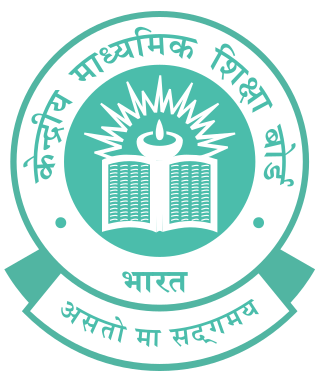
The Central Board of Secondary Education (CBSE) is a national level board of education in India for public and private schools, controlled and managed by the Government of India. Established in 1929 by a resolution of the government, the Board was an experiment towards inter-state integration and cooperation in the sphere of secondary education. There are more than 27,000 schools in India and 240 schools in 28 foreign countries affiliated to the CBSE. All schools affiliated to CBSE follow the NCERT curriculum especially from class 9 to 12. The current Chairperson of CBSE is Rahul Singh, IAS.
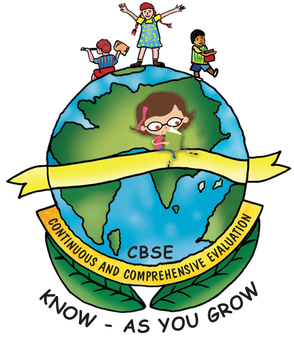
Continuous and Comprehensive Evaluation (CCE) was a process of assessment, mandated by the Right to Education Act, of India in 2009. This approach to assessment was introduced by state governments in India, as well as by the Central Board of Secondary Education in India, for students of sixth to tenth grades and twelfth in some schools. It was intended to provide students with practice from a young age for the board exams. In 2017, the CCE system was cancelled for students appearing in the Class 10 Board Exam for 2017–18, bringing back compulsory Annual Board Exam and removing the Formative and Summative Assessments under the Remodeled Assessment Pattern.

Madhya Pradesh Board of Secondary Education is a board of school education in Madhya Pradesh State of India.
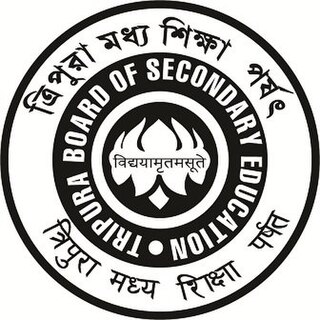
Tripura Board of Secondary Education (TBSE) is a board of school education in the state of Tripura, India. Currently Dr.Bhabatosh Saha is the president of TBSE.It is a state agency of the Government of Tripura which is responsible for the promotion and development of secondary education in the state. Most of the public schools of the state follow the TBSE system.
Chhattisgarh Board of Secondary Education is a board of education in the state of Chhattisgarh, India. CGBSE is a state agency of the Government of Chhattisgarh, it is responsible for promotion and development of secondary education in Chhattisgarh. The Board has conducted its exams independently from the year 2002, and conducts High School, Higher Secondary and Diploma Courses.
The National Institute of Open Schooling (NIOS), formerly National Open School is a national level board of education in India, controlled and managed by the Government of India. It was established by the Ministry of Education of the Government of India in 1989.
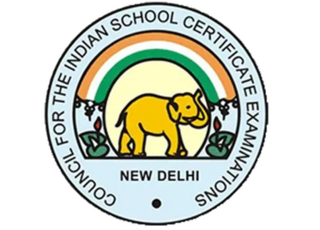
The Council for the Indian School Certificate Examinations (CISCE) is a non-governmental privately held national-level board of school education in India that conducts the Indian Certificate of Secondary Education (ICSE) Examination for Class X and the Indian School Certificate (ISC) for Class XII.
The Indian Board of School Education (IBOSE), is the Board of Education for private education, under the Government of India. It was established by the S.R. Acts XXI of 1860 of the Government of India in 2007 to provide education inexpensively to remote areas. The IBOSE is a national board that administers examinations for Secondary and Senior Secondary examinations of schools.







